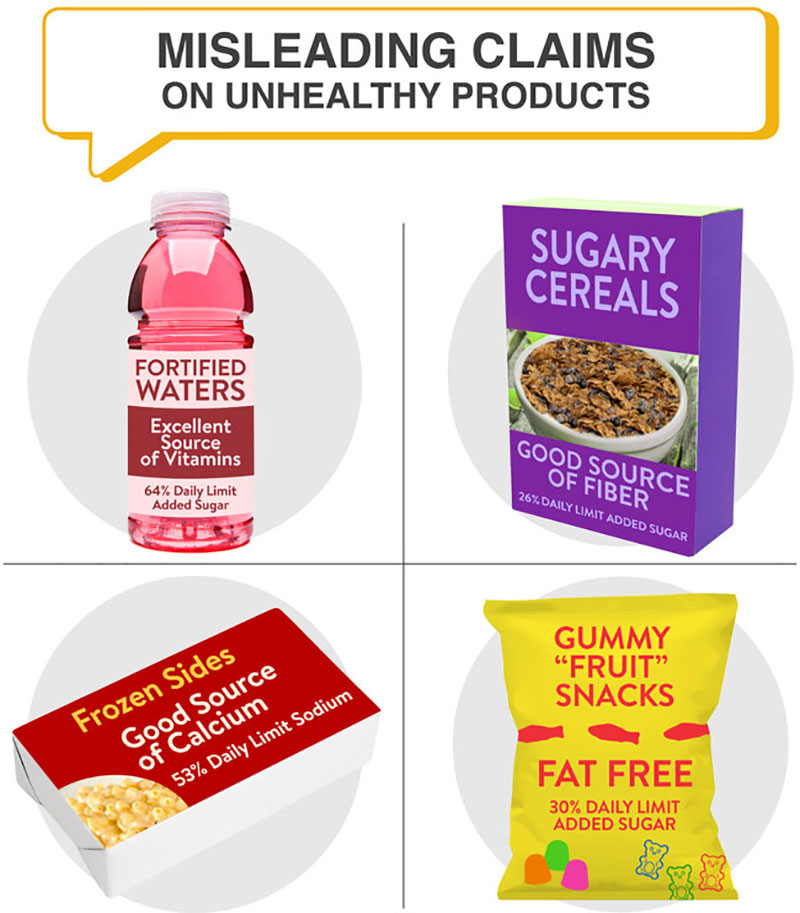Kind Healthy Snacks, with support from health and nutrition experts, filed a Citizen Petition urging the FDA to update the nutrient content claim regulation. The current regulation looks at the quantity of a nutrient instead of the quality of the overall food, which enables food marketers to put these claims on unhealthy products. As a result, consumers are led to believe these items are part of a healthy diet and misled into purchasing them.
Nutrient content claims are misused on a variety of products, including sugary cereals and snacks and sodium-packed frozen dishes, which highlight beneficial nutrients but avoid calling out other less appealing aspects of the food.
“Dressing up empty-calorie products by emphasizing a singular nutrient, like protein or fiber, vs. the overall quality of the food is unfair to consumers,” says Daniel Lubetzky, founder and CEO of New York-based Kind. “By bringing greater rigor to the use of nutrient claims, FDA can increase label transparency and help people better identify foods that contribute to a healthy diet, which Kind has long advocated for.”
Registered dietitians (RDs), who see firsthand the negative impact these claims can have on people, agree to dust off a regulation that was implemented in the 1990s.
According to a new survey1:
- 75 percent of RDs say that the top reason nutrient content claims impact purchases is because clients/patients believe the food bearing the claim is a healthy item.
- 85 percent of RDs say that they often come across products with nutrient content claims that they would not recommend as part of a healthy diet.
A survey2 fielded by Washington D.C.-based Morning Consult reinforces the role these claims play in consumers’ lives. Specifically, more than 68 percent of consumers say that nutrient content claims are important when deciding which products to purchase. While the claims are influential, consumers agree they are not as clear as they could be, with a majority (56 percent) saying FDA should update regulation to make nutrient content claims less misleading.
The petition is in line with FDA’s 2018 Strategic Policy Roadmap3 in which the agency emphasizes its goal to create “better ways of communicating nutrition information to consumers so they can be empowered to make good choices.”
It also supports FDA’s ongoing effort to update the definition of “healthy,” according to Stephanie Csaszar, a registered dietitian and health and wellness expert at Kind. “FDA has already taken strides to evolve how ‘healthy’ can be used on food labels. We applaud their work and hope that by encouraging a holistic view of nutrient content claims our petition furthers that thinking in a way that is productive and benefits public health.”
In the petition, the company asks the FDA to only allow nutrient content claims on items that contain a meaningful amount of a health-promoting food such as vegetables, whole fruits, whole grains, legumes and nuts. Nearly half (45 percent) of RDs surveyed agree with this request, saying that to make a nutrient content claim a food should contain a significant quantity of foods recommended for healthy eating. The petition also requests adjustments to current disclosures as well as the addition of a disqualification threshold that would ban unhealthful products from making such claims.
Dr. Katz, a co-signatory, says, “I’m pleased to support the petition. Amending the nutrient content claim regulation to ensure that the majority of a product is made from a genuinely nutritious food source will have a lasting impact on public health.”
Sara Baer-Sinnott, the president of Oldways and another co-signatory, said, “Oldways is pleased to join as a signatory on the petition. By highlighting wholesome plant foods, this petition provides a sensible path to advance public health by empowering consumers with clear nutrition information.”
1 This poll was conducted from Feb. 18-March 4 among a national sample of 595 registered dietitians. All respondents are part of Kind’s Nutrition Collective; however, none are employed by Kind and the views expressed are their own.
2 This poll was funded by Kind and conducted from Feb. 19-21, 2019, among a national sample of 2,202 adults.
3 fda.gov/NewsEvents/Speeches/ucm603057.htm.

